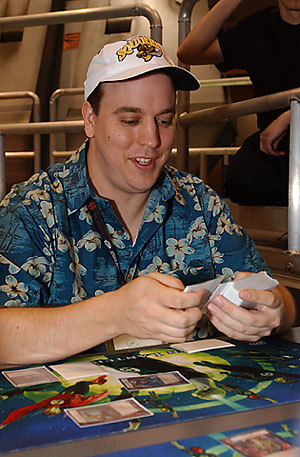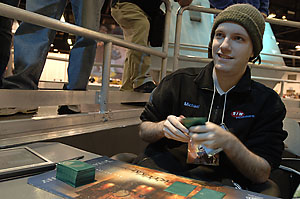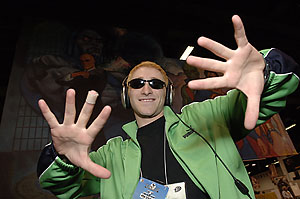
I have long maintained that Vs. System is a pretty difficult game to play. The way that it is put together forces each player to make a lot of tough decisions in increasingly complicated turns until eventually somebody prevails.
There are many very cool plays that can be made, and for me, that’s where much of the fun lies. But at the same time, it can be pretty frustrating when you realize (inevitably just after the point of no return) that you have made a wrong decision that has cost you a game.
In Sealed Pack formats, you have to make choices regarding which cards in your card pool to run based on the power of individual cards, how well they work with each other, and how useful they will be against whatever cards your opponents will have chosen to use. These same choices exist in Constructed, but with slightly differing levels of importance. There are a lot more cards around, so decks need to be more powerful. Of course, everybody knows this, and most players gravitate to the most powerful deck or decks. What this means is that it’s easier to predict what other people are going to do, and in turn, to try to stop them. This is called playing the metagame—the game that I find to be the trickiest but also the most fun game of all.
Last week, I took a little foray into playing and writing about Yu-Gi-Oh! as a break from the set of Vs. decisions I was used to (both deciding what to play and what to write about). Yu-Gi-Oh! is an interesting game, and I feel that spending a little bit of time attacking for 2,300 rather than 6 was actually pretty handy for my Vs. play.
There are a few big differences between the two, most notably in terms of the power levels of the cards. There are plenty of ways in Yu-Gi-Oh! to control the board with powerful removal effects, such that whatever is on the field on one turn cannot be guaranteed to be there on the next. Equally, individual monsters (this is a game of monsters rather than heroes) can create much bigger swings. These swings can come at any time, as the lack of an escalating number of resource points each turn means that you can play your bigger monsters on earlier turns as well as on later ones.
What all of this adds up to is that Yu-Gi-Oh! decks tend to be less synergy-oriented than Vs. decks and more about working with as much raw power as possible. Drawing only one card per turn rather than two, players will try to get up on opponents either by using one of their own cards to deal with multiples of their opponent’s, or by working on winning so fast that opponents don’t have a chance to draw into answers naturally. When the power level is high and decks are similar, there is quite a lot of room for metagaming against them.
One rather endearing feature of Yu-Gi-Oh! players is that they are, in my experience, a pretty vocal bunch. I have had a whole bushel of emails from people looking to get my opinion on what to play, what not to play, how best to attack for eleventy-billion with SuperMegaCyber6HeadedGiantFireDragonBehemoth . . . all sorts. These poor people don’t necessarily realize that I don’t know a whole lot about the game, but I have done my level best to answer their queries anyway.
You see, I have a few little rules that I like to follow when working out what strategy to take in most things. Much as I would have loved to have given out some truly earth-shatteringly awful advice and then sat back and watched the train wreck happen (I’m quite mean like that), I took the high road and imparted a few handy tips.
As I write a lot more about Vs. than Yu-Gi-Oh!, it felt a little rude to keep this advice limited to the ranks of wide-eyed manga card players. So, here are my rules.
Play the best deck.
Remember all the rhapsodizing I have done about the power of playing a deck that is all clever and cunning and full of neat little tricks? Such tricks need to be very good to make a deck a “best deck.” I’m sure you’re thinking that if everyone followed this advice, the game would be very boring indeed, as everyone would play the same deck. But I don’t actually believe that there is often a single “best deck” in a metagame; there are almost always a few. For those of you who got confused by the heading of this section, I apologize. Dan Brown has managed to make a fair career from having unspectacular “twists,” and I fancied a piece of the pie. You see, there are various things that decks can seek to achieve based on speed, control, board presence, and so on. Decks don’t need to be able to compete on all fronts all the time. I would recommend, though, that if you are going to be aggressive, you should be really aggressive. Shilly shallying about will mean that you are playing a deck that gets outclassed by opponents all day long one way or another. If your deck doesn’t feel powerful, then you need a pretty good reason to keep playing it.
If you insist on playing a deck that isn’t the best, play to beat the best.
 I am not risk averse. If there is a metagame dominated by a single deck, then I am more than happy to sit down and spend some time on a deck that is designed to be the best deck at beating what most players are playing. It might have a bad matchup against a lot of the rest of the field, but if the rest of the field is pretty small by comparison, what’s to lose? Michael Barnes did it at Pro Circuit New York; Dave Spears did it at PC Indy 2. If you have a good idea of the metagame, then it can be worth taking a risk. The way that prize payouts work, you need to do exceptionally well to come out on top at Vs. System, and that typically takes a little luck on top of the skill. Gamble a little. If I play in two Pro Circuits, I would much rather come in dead last in one and then win the other than finish in the middle of the pack at both. The first way, I could smother my sorrows with little green bits of paper with pictures of dead presidents on them. And if I decide that I don’t like the presidents anymore, I can always exchange them for something better.
I am not risk averse. If there is a metagame dominated by a single deck, then I am more than happy to sit down and spend some time on a deck that is designed to be the best deck at beating what most players are playing. It might have a bad matchup against a lot of the rest of the field, but if the rest of the field is pretty small by comparison, what’s to lose? Michael Barnes did it at Pro Circuit New York; Dave Spears did it at PC Indy 2. If you have a good idea of the metagame, then it can be worth taking a risk. The way that prize payouts work, you need to do exceptionally well to come out on top at Vs. System, and that typically takes a little luck on top of the skill. Gamble a little. If I play in two Pro Circuits, I would much rather come in dead last in one and then win the other than finish in the middle of the pack at both. The first way, I could smother my sorrows with little green bits of paper with pictures of dead presidents on them. And if I decide that I don’t like the presidents anymore, I can always exchange them for something better.
Whatever you play, practice with it.
 Michael Jacob has made a name for himself on the Pro Circuit for a number of
Michael Jacob has made a name for himself on the Pro Circuit for a number of
things. He is definitely a very good player. He has shown that he loves to play decks that aren’t necessarily what everyone else is playing. A lot of the time he plays those decks to a level of success that nobody else can manage. He played his trademark deck, Force, from the earliest $10K events all the way up until he won a trophy with it over a year later. Meanwhile, virtually nobody else could replicate his achievements. Having seen MJ playing Force, it is obviously powerful. The difference between MJ and everyone else is more than just skill. He simply has so much more experience with the deck than everyone else. Many decisions that would be really tough for most players are almost second nature for Michael, as he is familiar with the situation and knows what he needs to do. He knows what is likely to come of a decision a few turns down the line and can play accordingly.
Similarly, Dean Sohnle has had unparalleled success with Fantastic Fun. A powerful deck it certainly is, but his success is due as much to his familiarity with it as it is to the incredible potential in the cards themselves. If a deck is powerful, it is worth spending the extra time to learn it inside out. It can only get stronger in the hands of a master.
If I were testing for Pro Circuit Atlanta (and I am, though I will be reporting rather than playing), then I would be looking to settle on my final deck by this weekend, with a mind to playing it against every deck I expect to face at the Pro Circuit in the rest of the time. Knowing what to do in common situations means that you can focus your energies on the more important decisions, and indeed on having a bit of fun. I’m not going to start giving too many hints, but I will recommend that whatever deck you play either should be the quickest and most aggressive, or it should be able to deal with that sort of thing. Slow and steady the format is not.
 My other little tip would be that after you select what deck to play in Atlanta, don’t forget to draft. Aaron Weil taught us as much by his performance in Draft as he did in Constructed at PC L.A. last year. While having a focused Constructed deck is a great idea, you need to have all aspects of your game prepared to be a champion.
My other little tip would be that after you select what deck to play in Atlanta, don’t forget to draft. Aaron Weil taught us as much by his performance in Draft as he did in Constructed at PC L.A. last year. While having a focused Constructed deck is a great idea, you need to have all aspects of your game prepared to be a champion.
If you have any spare time, I also recommend that you practice a little for The Willoughby Team Classic, which will be running on the Thursday before the PC. It has been suggested that I should rename the event Tim-vitational Number 2. There have been some pretty competitive-sounding teams readying themselves for this one, which I think should be good fun. If you are there on Thursday, feel free to stop by and have a look. This Faux Circuit will be available to play in before the main event kicks off, and depending on turnout, there might even be a few extra slots open for teams that don’t quite hit the official entry criteria.
Until the next time, have fun and be lucky.
Tim “UltimateDragonPirateNinjaMysticalPotOfGamesPlayingWriterGuyWithAnAccent – Level 2” Willoughby
timwilloughby@hotmail.com